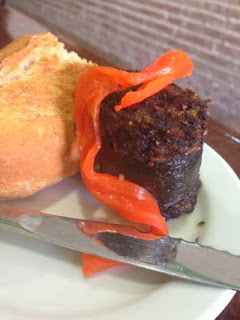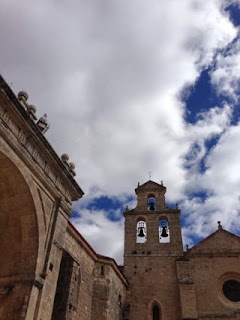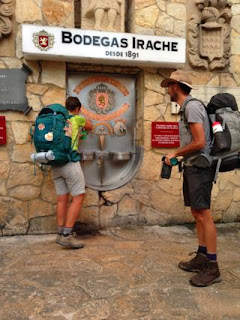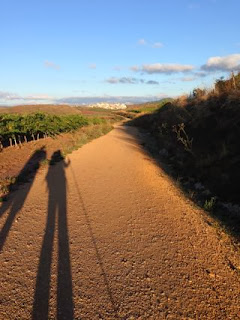 |
| Dinner time in the albergue |
Expenses (in euros)
Day 9 to Nájera
Hostel, 5
Groceries, 9
Total: 14
Day 10 to Santo Domingo
Hostel, 7
Groceries, 9
Total: 16
When doing research to figure out how much money we should budget for the Camino, I came across wildly conflicting information online. Some sites suggested we would have no problem sticking to a 25 euros per day budget, others recommended setting aside 45 euros per day minimum for accommodations alone. From our experience so far, and the experiences of the other hikers we've been spending time with, both suggestions seem to make sense depending on your approach.
How much money hikers spend on the Camino on a daily basis depends mainly on what each individual's finances can accommodate and, to some extent, the type of experience being sought. Though there's no getting around the gruelling challenge of hiking 500 miles, there are a number of support services available for those with a little extra cash to shell out that can make the going less strenuous. For example, you can ship your belongings by courier each day (or at least on days when you'd like a rest) for the reasonable cost of 7 euros. If you go this route you'll only need to carry what you need for the day - food and beverages and extra clothing if needed - in a small day pack. If carrying a small day pack is still beyond what you'd like to take on, some guide companies position support vans at regular intervals along the day's hike to provide food and supplies - beverages, fresh fruit, medical supplies, etc.
For the "average joe" peregrino, where food requirements are concerned, you have a number of options for keeping your furnace stoked. You can purchase food at the Supermercado and cook your meals in the albergue at night for a surprisingly reasonable daily cost, or you can indulge in the culinary offerings of the many fine restaurants you'll find along the way for about 5 euros and up per meal. For accommodation, you can usually find a bed in a municipal or private albergue for somewhere between 5-10 euros. If you'd prefer more privacy, a double room in a small hotel or "casa rural" usually costs between 30-45 euros and can go up from there depending on the level of luxury you're looking to attain…to some extent.
The quality of the albergues and hotels along the Camino fluctuates wildly. A budget traveler might stay in a lovely recently renovated albergue with full amenities in a historic building for 5 euros, while a traveler with a bigger budget for accommodations might end up in a poorly maintained and serviced 3-star hotel for 8 times the price. You never quite know what to expect at the end of the day - unless, of course, you've recently hiked the Camino and are staying at the exact same spots you stayed in the last time around.
Which brings me to my reflection on our Camino experience over the past couple of days. We had such a fantastic stay at the albergue in Santo Domingo (cost by donation) I thought it warranted a mention in a blog post. We were greeted at reception by two friendly gentlemen who offered us chorizo on fresh bread, wine and watermelon slices. Oh yes! The newly restored and expanded building was extremely clean and spacious with plenty of bathrooms and shower stalls (with lots of hot water), a large kitchen (with a stove AND an oven!), large dining area and even a lounge area with comfy leather sofas. As far as outdoor spaces go, the albergue's quiet courtyard had a nice grassy yard with a huge picnic table and a chicken coop (in a nod to a local legend that features a chicken that plays a key role in saving a young man's life).
I also wanted to mention that the helpful staff at all the establishments we've stayed at so far have been wonderful. Many of the municipal albergues along the Camino are staffed completely by volunteers who run the registration desks and take care of day-to-day operations out of the goodness of their hearts. Many go beyond the call of duty to assist hikers with treating their foot and leg ailments, provide tips and advice on local sights to see, and help sort out details when minor issues occur - like when you arrive at the next albergue and realize you left your adaptor behind at the last one. God bless the albergue volunteers!




















































